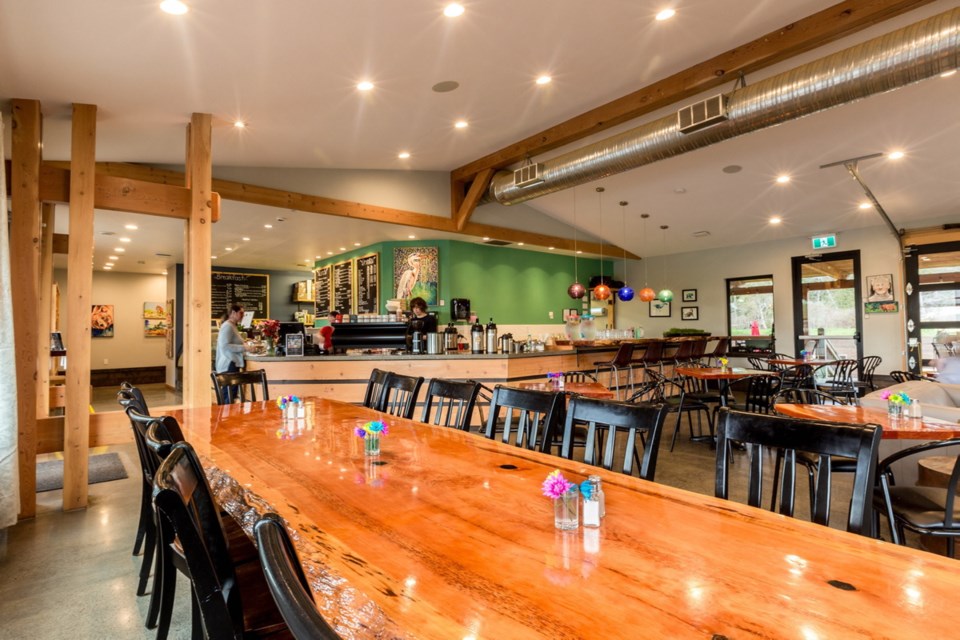The operators of a Vancouver Island farm-to-table eatery said emotional good-byes to customers and staff Sunday before closing their doors indefinitely after a decision from the Agricultural Land Commission.
Jodie Lucas and Will Gemmell have been running the Rusted Rake restaurant at their Nanoose Bay farm, which is on property that is part of the Agricultural Land Reserve. They have tried various ways over two years to follow Agricultural Land Reserve rules to keep their business open, including switching crops to barley and adding beer-brewing equipment.
“We don’t know what our next move is,” Lucas said. “Do we fight, or just call it a day and move forward in another direction? We just don’t know.”
An Agricultural Land Commission panel unanimously refused the owners’ proposal to construct a brewery and to continue to operate the restaurant, which is considered a non-farm use in the Agricultural Land Reserve.
Part of the issue is that the owners did not get their land rezoned to allow a commercial restaurant before they built it, something that needs to be sorted out with the regional government.
The panel also found “that there is not a sufficient amount of agriculture to support a restaurant of the eatery’s size and scale given the number of seats and hours of operation.” The restaurant has been open 8 a.m. to 5 p.m. six days a week and can accommodate about 100 people inside and 40 outside.
As a result, the farm has become secondary to the restaurant, the panel said. “The panel is not amenable to supporting a proposal which would result in a farm operation becoming ancillary to a non-farm use.”
“For these reasons the panel finds that the eatery is not an appropriate use of the property and would be more appropriately located outside of the ALR in an area that is zoned for commercial restaurant use.”
Months after opening the restaurant, Gemmell and Lucas were informed that it was a non-farm use and not permitted unless it was attached to a brewery or winery, for example.
The couple responded by planting barley to start a brewery and spent $150,000 for brewing equipment.
But the panel found the proposed brewery does not meet regulations that require at least 50 per cent of the primary farm product used to make the alcohol each year to be harvested from the agricultural land on which the alcohol production facility is located, or in some cases also from another B.C. farm under a contract of at least three years.
The commission noted its intention in refusing the brewery “at this time” was not to “stifle the applicants’ plan to operate a brewery on the property,” but rather to encourage the applicants to “continue their efforts to increase the primary farm production on the property to meet the threshold.”
The farm has a 15-bed greenhouse, garden and vegetable beds, 700 blueberry plants, fruit and nut trees, and several grain fields, including two hectares of barley. It also has chickens, geese, bees and two steer. The vegetables, eggs and beef served in the restaurant were raised on the farm.
Frank Leonard, former chairman of the Agricultural Land Commission, said there are two ways for the Rusted Rake to reopen: Gemmell and Lucas can either push for a political solution, as they are doing now, by pressuring the government to make changes to Agricultural Land Reserve regulations, or work to come into compliance with existing regulations.
The couple has already launched an online petition calling for changes to ALR regulations. Leonard said another option would be to appeal and get a short-term permit to operate — but Lucas and Gemmell would have to show how they plan to comply with the law.
The Rusted Rake’s online petition asks the government to change regulations regarding food-service facilities in the Agricultural Land Reserve.
“Currently, under the ALR rules and regulations, farmers are not allowed to have a food service facility [such as a restaurant] unless there is an alcohol facility [such as a brewery] on the farm,” Lucas wrote.
“By allowing farmers to operate food service facilities without liquor production, we will be providing more opportunities for businesses like ours to exist and to give small farms like ours a chance to make a living wage.”
Agriculture Minister Lana Popham said in a statement that she is aware of the ALC decision and noted the commission is an independent administrative tribunal with a mandate to preserve agricultural land and encourage farming in British Columbia.
Popham said the government supports farmers who want to have value-added activities on their farms within the ALR.
“We are always considering ways to increase the business opportunities available to farmers within the ALR, while recognizing that any changes must be balanced, and ensure we continue to protect valuable agricultural land in B.C.,” she said.
Parksville-Qualicum Liberal MLA Michelle Stilwell said the rules are too rigid and the government needs to be flexible and recognize unique locations and circumstances.
“What it comes down to is the NDP with the ALC in relation to the ALR being very rigid in terms of what non-farm use is,” she said.
“Here we have a young couple trying to make a go of being farmers using the land and to grow their business to feed the community to bring in other farmers’ products,” said Stilwell. “It’s really disappointing and kind of ridiculous that some rules like this don’t take into consideration the unique context of the applications coming forward.”
Popham said in coming weeks the government will be engaging directly with farmers, the public and stakeholders to discuss “how we can support more value-added activities on farms within the ALR.”



